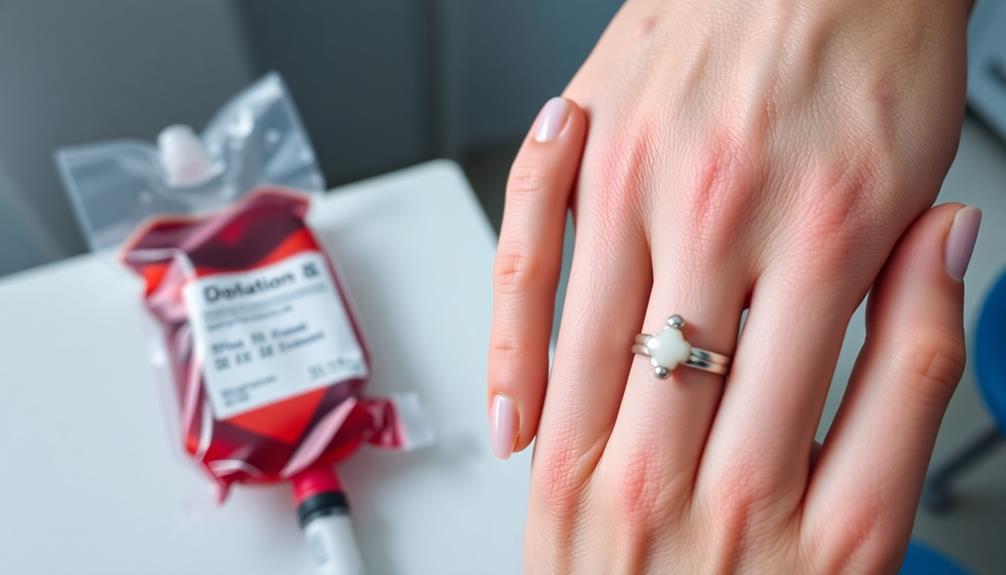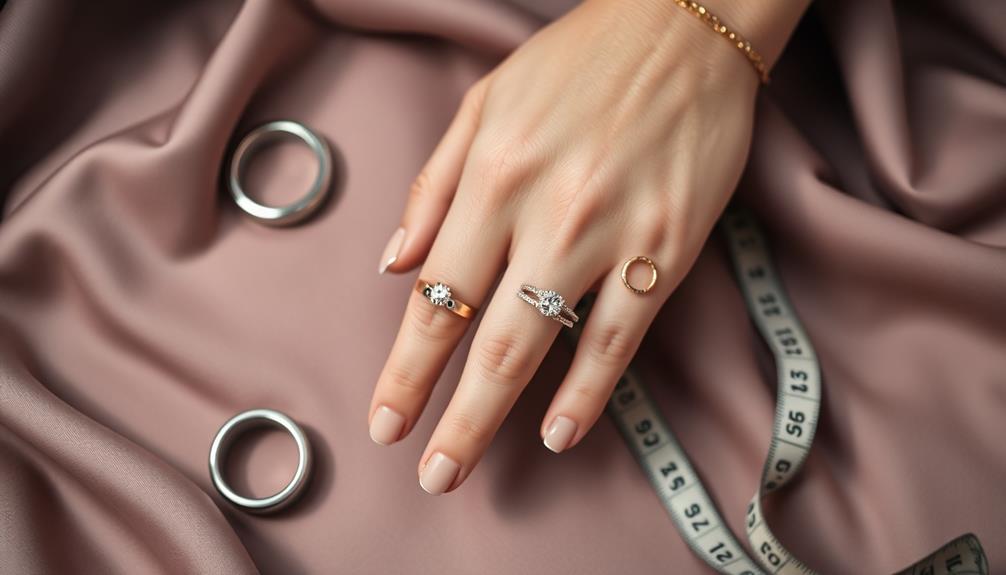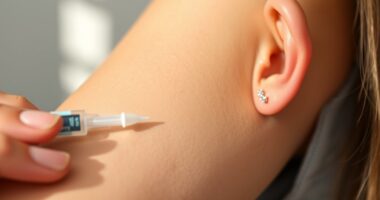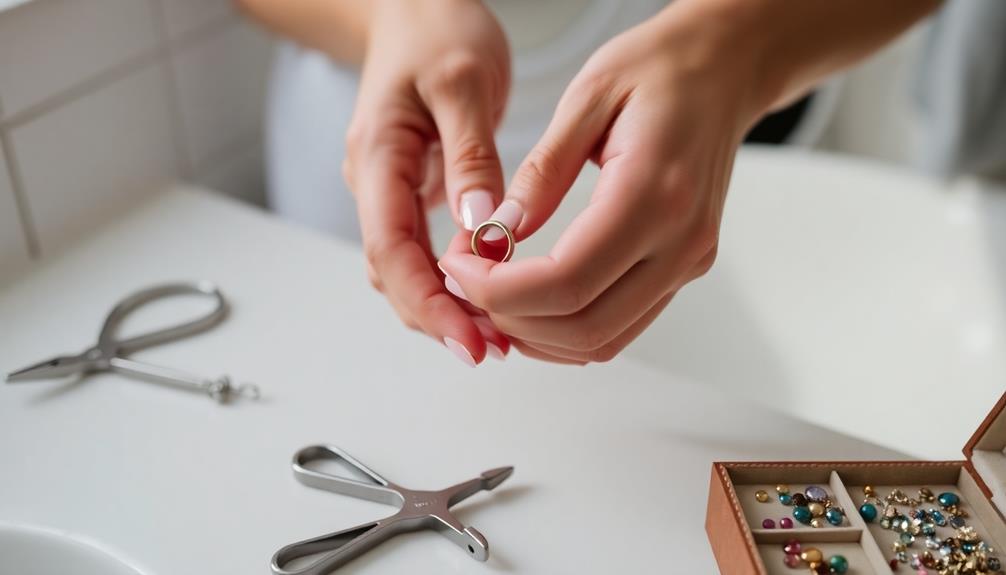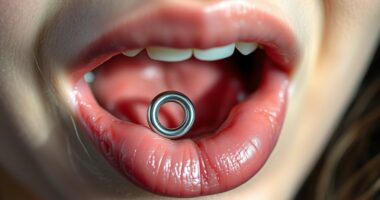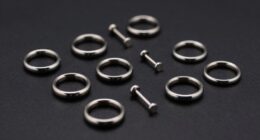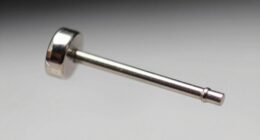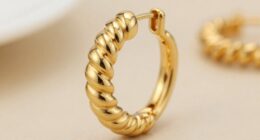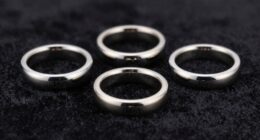If you've recently gotten a piercing, you need to understand the donation guidelines. You can donate blood immediately if your piercing was done with sterile, single-use equipment and is fully healed. However, if it was done in an unregulated setting with reusable instruments, there's a three-month waiting period. It's important to verify your piercing shows no signs of irritation or infection before donating. Be sure to disclose any recent piercings during your health screening. Knowing these rules can help you stay eligible, and there's more to explore about the full blood donation process and safety measures.
Key Takeaways
- Healed piercings done in regulated facilities allow for immediate blood donation eligibility without waiting periods.
- Piercings from unregulated settings require a three-month waiting period before donating blood.
- Ensure piercings are free from irritation or infection before donating to meet health standards.
- Full healing of piercings is essential; signs of irritation or infection disqualify you from donating.
- Disclosing recent piercings during health screenings is crucial for safe blood donation practices.
Understanding Blood Donation Eligibility
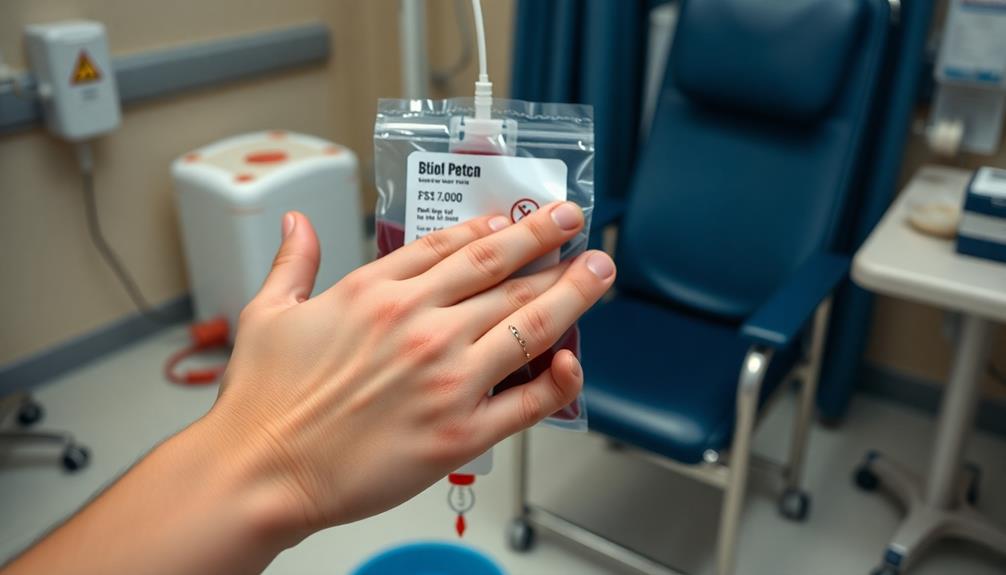
When it comes to blood donation eligibility, it's important to keep a few key points in mind. If you've recently had piercings, you'll need to confirm they meet certain criteria to be eligible to donate.
For instance, if your piercings were done using single-use, disposable equipment in a state-regulated facility, you can donate blood immediately, provided they're completely healed.
However, if your piercings were done with reusable instruments or in an unregulated setting, you'll face a three-month waiting period before you can donate. This waiting period is vital for health and safety, as it helps minimize the risk of infection.
Before you head to the donation center, remember that donors must confirm their piercings are free from irritation, infection, or any healing issues.
During the eligibility screening process, don't forget to disclose any recent piercings. Being honest guarantees compliance with health and safety guidelines, making the donation process smoother for everyone involved.
Impact of Tattoos on Donations
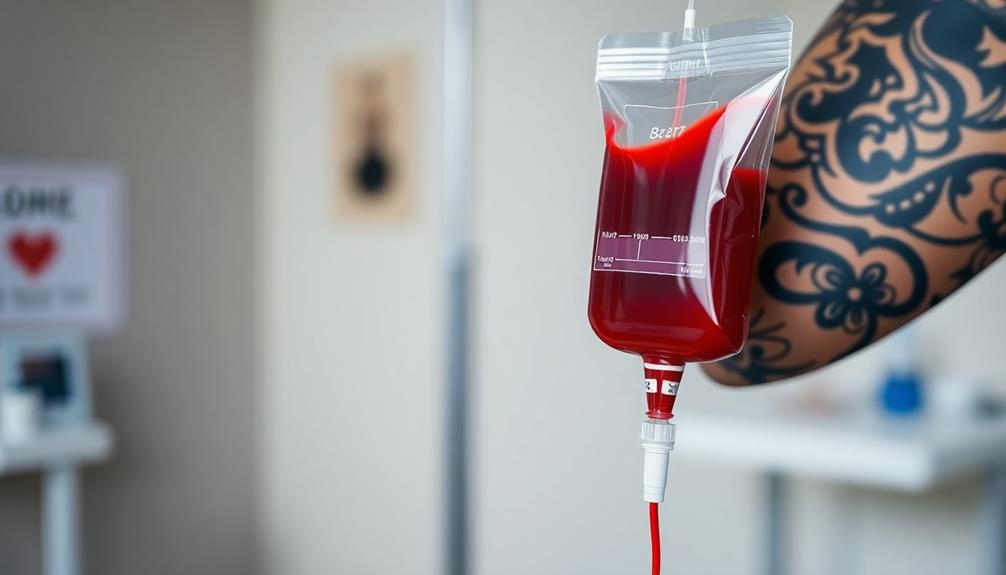
When considering blood donation, it's important to understand the regulations surrounding tattoos.
Just like with piercings, healing requirements and waiting periods play a vital role in your eligibility.
Let's explore how these factors affect your ability to donate after getting a tattoo.
Tattooing Regulations Overview
Understanding the regulations surrounding tattooing is vital for anyone considering blood donation. Tattoos should be performed in state-regulated facilities to guarantee safety and hygiene standards are met. When you get a tattoo from a regulated facility, it doesn't affect your donation eligibility, provided you feel healthy and meet other criteria.
However, if you receive a tattoo from an unregulated facility, there's a three-month waiting period before you can donate blood. This waiting period helps mitigate the risk of hepatitis transmission, which can occur if sterile practices aren't followed. It's important that tattoo artists use sterile needles and non-reused ink during the tattooing process to avoid contamination.
Additionally, don't forget about the healing process. You'll need to wait until your tattoo is completely healed, with no peeling, scabbing, or itching, before you can donate blood.
Healing Requirements for Tattoos
Healing is a crucial factor to contemplate after getting a tattoo, especially if you're planning to donate blood. You need to guarantee that your tattoo is completely healed, meaning no peeling, scabbing, or itching. This is fundamental to meet the eligibility requirements for donation.
If your tattoo was done in a regulated facility using sterile needles and non-reused ink, you won't have to worry about a waiting period. However, if it was done in an unregulated state, you'll need to wait three months before considering a donation. Healing time can vary, so it's important to monitor your tattoo's recovery closely.
Here's a quick reference to help you understand the healing requirements:
| Tattoo Location | Healing Status | Donation Eligibility |
|---|---|---|
| Regulated Facility | Fully Healed | Immediate |
| Regulated Facility | Not Fully Healed | Not Eligible |
| Unregulated Facility | Fully Healed | 3-Month Waiting Period |
| Unregulated Facility | Not Fully Healed | Not Eligible |
Waiting Period Explained
The waiting period for blood donation after getting a tattoo can greatly impact your ability to give blood. If you've received a tattoo from an unregulated facility, you'll need to wait three months before heading to the donation center. This waiting period is in place to prevent potential hepatitis transmission and protect public health.
During this time, it's essential that your tattoo heals completely; that means no peeling, scabbing, or itching.
However, if your tattoo comes from a state-regulated shop that meets all safety standards, you won't have to wait at all! This shift, following new FDA guidelines, underscores the significance of health and safety in tattooing practices.
Always verify your tattoo is done with sterile needles and single-use ink to stay on the safe side and avoid disqualification from donating blood.
Body Piercings and Donation Guidelines

When you get a body piercing, it's essential to guarantee it's done with single-use tools in a regulated facility to reduce infection risks.
If your piercings are done with reusable instruments, you'll need to wait three months before you can donate blood.
However, once your piercings are completely healed without any irritation or infection, you can donate right away.
Piercing Procedure Requirements
Getting a body piercing can be an exciting experience, but it's important to follow specific guidelines if you plan to donate blood afterward.
First, confirm that your piercing is performed in a state-regulated facility that uses single-use equipment. This practice is essential for your safety and helps prevent infections during the procedure.
If your piercing is done correctly and fully healed, you won't have to worry about a waiting period for blood donation.
However, if the piercing was performed using reusable instruments or at an unregulated facility, you'll need to wait three months before you can donate blood.
Make certain your piercing is completely healed, showing no signs of peeling, scabbing, or itching. These healing signs indicate that your body is still recovering, and donating blood during this time could pose risks.
Healing Time Considerations
After confirming your piercing is done safely, it's vital to understand the healing process and its impact on blood donation. If your piercings are fully healed without any signs of irritation or infection, you can donate right away.
However, if your piercing was done with reusable instruments, you'll need to wait three months. This waiting period helps reduce the risk of infection transmission, which is significant for maintaining donor eligibility.
Always verify that your piercings were performed in state-regulated facilities, as this guarantees adherence to safety and health standards. Donors should be vigilant about the healing status of their piercings before attempting to donate.
Any signs of healing issues, such as redness or swelling, may disqualify you from the donation process.
Guidelines for piercing donation closely resemble those for tattoos, so it's necessary to prioritize the use of single-use, disposable equipment.
By taking these precautions and allowing adequate healing time, you can help confirm that your blood donation is safe for both you and the recipient.
Importance of Waiting Periods

The importance of waiting periods in blood donation can't be overstated, especially when it comes to recent piercings. If you've recently had a piercing done with reusable instruments, a three-month waiting period is necessary. This precaution helps mitigate the risk of infection transmission, particularly concerning hepatitis B and hepatitis C, both of which can be transmitted through contaminated blood.
While all blood donations undergo rigorous testing for these viruses, the waiting period is a required measure for your safety and the safety of recipients. It's imperative to allow enough time for any potential infections to become detectable before you donate. This way, you help prevent possible complications from infections acquired during the piercing process.
On the other hand, if your piercings were done in state-regulated facilities using single-use, disposable equipment and are completely healed, you can donate blood immediately.
Understanding the importance of these waiting periods guarantees you contribute safely to the blood supply, protecting both yourself and those in need of transfusions. So, keep this in mind—waiting isn't just a formality; it's an essential step in safeguarding everyone's safety.
Safety Measures for Donors

Safety is paramount when it comes to blood donation, especially for those with recent piercings. If you've had a piercing done in a non-regulated facility, you must wait three months before you can donate blood. This waiting period is essential to minimize the risk of infections that could jeopardize both your health and the safety of the blood supply.
To guarantee your eligibility to donate blood, always disclose any recent piercings during the eligibility assessment. This step helps blood donation centers implement necessary safety measures.
Piercings should ideally be performed with sterile, single-use equipment to further reduce the risk of transmitting bloodborne infections. If your piercings are completely healed, you won't have to wait and can donate blood right away.
Health Criteria for Donating Blood

What health criteria do you need to meet to donate blood? If you have piercings, you must guarantee they were done using single-use, disposable equipment. This is vital for your eligibility to donate.
If your piercings were performed with reusable instruments, you'll need to observe a three-month waiting period before you can donate.
Once your piercings are completely healed, and there are no signs of infection or irritation, you can donate blood immediately.
During the health screening process, it's important to disclose any recent piercings. This transparency guarantees compliance with eligibility criteria and promotes safety for both you and the recipients of your blood.
Proper healing of all piercings is essential, as it helps prevent complications and assures the overall safety of the blood donation process.
Remember, meeting these health criteria not only protects you but also guarantees that the blood supply remains safe for those in need.
Always check with your local blood donation center if you have any questions regarding your eligibility after getting piercings.
Common Myths About Donation
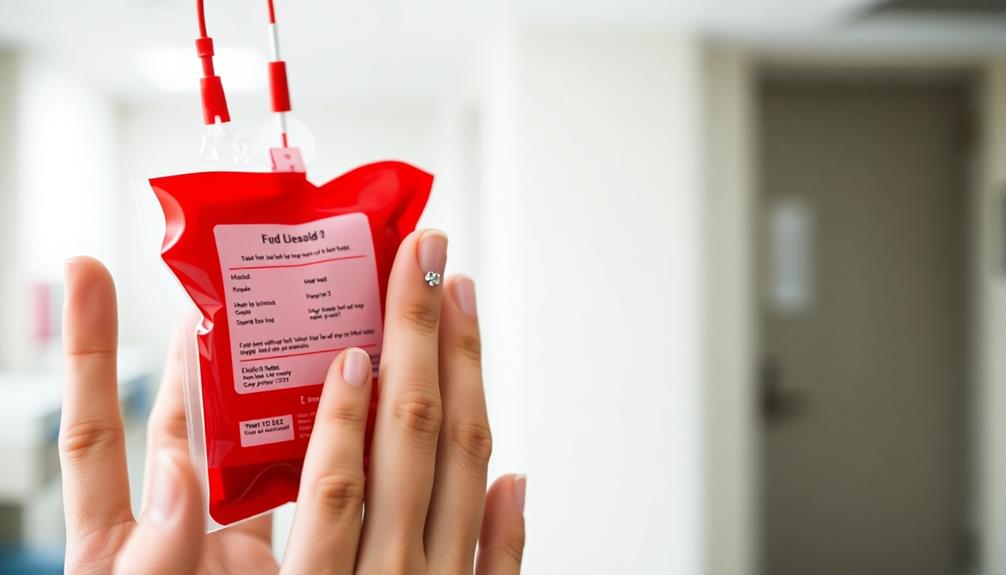
Many people hold misconceptions about blood donation, particularly concerning body piercings. One common myth is that any body piercing disqualifies you from donating blood. In reality, as long as your piercings are done in state-regulated facilities and are completely healed, you can donate blood immediately.
Another misconception is that a waiting period is required for all piercings. Actually, only piercings done with reusable instruments have a three-month waiting period.
Many assume that tattoos and piercings share the same eligibility rules, but that's not the case. Tattoos have a specific three-month waiting period if done in unregulated states, while piercings don't unless they were done using non-sterile methods.
Some people also falsely believe that having multiple piercings impacts your donation eligibility. As long as each piercing was performed safely and is healed, you can still donate blood without any issues.
Blood Donation Process Overview

The blood donation process is straightforward and designed to guarantee your safety and comfort. It all begins with a health screening, where you'll provide your medical history and undergo a brief physical exam. This includes checks for your blood pressure, pulse, temperature, and hemoglobin levels. This step ascertains you're in good health before you donate blood.
Typically, whole blood donations take about 45-60 minutes, while apheresis donations can last 1.5-2 hours, including the health screening and recovery time. Remember to bring identification, like a donor card or a driver's license, and wear a shirt with sleeves that can be rolled up for easy access to your arm.
After your donation, it's important to rest and have a snack to help replenish your energy levels. Arriving well-hydrated and well-rested, along with eating a healthy meal beforehand, can greatly enhance your donation experience.
Following these guidelines helps ascertain that the entire donation process goes smoothly and that you feel good afterward. Donating blood is a generous act, and knowing what to expect can make it even more rewarding.
Resources for Potential Donors

As you prepare to donate blood, it's important to know where to find reliable resources that can help you understand eligibility requirements and health considerations. Local blood donation centers are a great starting point. They provide detailed information about the criteria for potential donors, including the impact of piercings on your ability to donate.
If your piercings were done with single-use, disposable equipment, you may be eligible to donate immediately if they're fully healed. However, if reusable instruments were used, you'll need to wait three months before you can donate.
During the health screening process, it's essential to disclose any recent piercings to guarantee compliance with safety regulations.
Additionally, many blood donation organizations offer online resources that outline these guidelines. They can help clarify anything you might be unsure about regarding blood donation eligibility and health screenings.
Make sure to take advantage of these resources, as they're designed to help you navigate any concerns related to your recent piercings and guarantee a safe blood donation experience.
Your commitment to donating blood is commendable, and being informed will help make the process smoother.
Frequently Asked Questions
Can I Donate Blood if I Got a Piercing?
If you've recently gotten a piercing, your ability to donate blood depends on how it was done and its healing status. Always check with the donation center to clarify your eligibility and ascertain safety.
What Would Disqualify Me From Donating Blood?
You'll be disqualified from donating blood if you have recent tattoos or piercings done with reusable instruments, show signs of infection, or haven't waited the required time for healing. Always check specific guidelines at your donation center.
Do Piercings Disqualify You From Donating Plasma?
If you've got piercings, don't fret; they won't automatically disqualify you from donating plasma. Just guarantee they're healed and done with sterile methods. If not, a three-month wait is your ticket to donate.
What Are Reasons You Can't Donate Blood?
You can't donate blood if you've had recent tattoos or piercings, undergone a transfusion, or have certain health conditions like HIV. Recent illness or specific medications can also disqualify you from donating.
Conclusion
In summary, understanding the guidelines around piercings and blood donation is essential for your eligibility and safety. Just as a well-tended garden flourishes, so does the health of our blood supply when we adhere to these protocols. By being informed and waiting the necessary periods, you guarantee that your contribution is not only safe but also impactful. So, take the time to prepare; your willingness to donate can make a world of difference to those in need.

